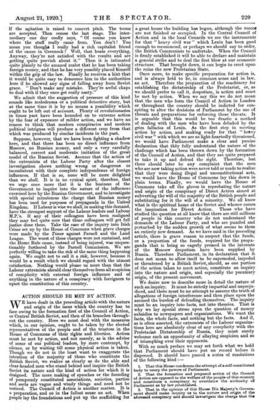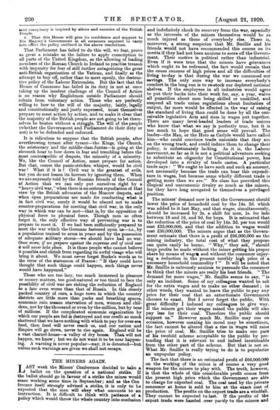ACTION SHOULD BE MET BY ACTION.
WE have dealt in the preceding article with the nature and origin of the issue which the country has to face owing to the formation first of the Council of Action, or Central British Soviet, and then of its branches through- out the country. Here we must deal with the measures which, in our opinion, ought to be taken by the elected representatives of the people and of the trustees in the House of Commons of their rights and liberties. Action must be met by action, and not merely, as is the advice of some of our political leaders, by mere contempt, by silence, or by waiting till some physical action is taken. Though we do not in the least want to exaggerate the intention of the majority of those who constitute the British Soviet, we realize as clearly as do the able and clear-headed men who stand behind and inspire the British Soviet its nature and the kind of action for which it is designed. The mere making of speeches or the founding of pompously constituted associations, societies, parties and sects are vague and windy things and need not be noticed. The Council of Action is another matter. It is a preparation, and so in the fullest sense an act. When people lay the foundations and put up the scaffolding for a great house the building has begun, although the rooms are not finished or occupied. In the Central Council of Action and in the local Councils we see the instruments for that " heavy civil war " which Lenin has been good enough to recommend, or perhaps we should say to order, the British Communists to undertake. When the Council is firmly established it will be able to declare and maintain a general strike and to deal the first blow at our economic structure. That brought down, it can begin to erect upon the ruins the new Proletarian State.
Once more, to make specific preparation for action is, and is always held to be, in common sense and in law, an act. Therefore the preparation of the machinery for establishing the dictatorship of the Proletariat, or, as we should prefer to call it, despotism, is action and must be met by action. When we say this we do not mean that the men who form the Council of Action in London or throughout the country should be indicted for con- spiring to alter the decisions of Parliament by the use of threats and preparations for enforcing these threats. It is arguable that this would be too drastic a method of dealing with the men who have been deluded by the grim fallacies of Lenin. As the first step in meeting action by action, and making ready for that " heavy civil war ' with which we are so light-heartedly threatened, we would have Parliament make a clear and precise declaration that they fully understand the nature of the challenge which has been thrown down by the formation of the Council of Action, and that they are quite prepared to take it up and defend the right. Therefore, lest there should later be any complaint that the men who are now taking action were never told or made to realize that they were doing illegal and unconstitutional acts, we would have the House of Commons lay this down in plain terms. Finally, we would have the House of Commons take off the gloves in reprobating the nature and origin of the conspiracy of Direct Action aimed at subverting the will of the majority of the British people and substituting for it the will of a minority. We all know what is the spiritual home of the Soviet and whence comes the inspiration for Direct Action. Those who have studied the question at all know that there are still millions of people in this country who do not understand the demands of the Labour Party, and who are puzzled and perturbed by the sudden growth of what seems to them an entirely new demand. As we have said in the preceding article, there is grave reason to suspect that the funds, or a proportion of the funds, required for the propa- ganda that is being so eagerly pressed in the interests of the Moscow despotism have been supplied by Russia. Therefore Parliament, in its declaration that it does not mean to allow itself to be superseded, impeded or threatened by a British Soviet, should, as one portion of the action taken to meet action, constitute an inquiry into the nature and origin, and especially the pecuniary origin, of the present movement.
We desire now to describe more in detail the nature of such an inquiry. It must be strictly impartial and unpreju- diced, and there must be no attempt to assume the truth of allegations of foreign interference and then place upon the accused the burden of defending themselves. The inquiry must be an inquiry into facts, not into theories. That is why we lay special stress upon the question of money subsidies to newspapers and organizations. We want the facts, the whole facts, and nothing but the facts. And if, as is often asserted, the extremists of the Labour organiza- tions here are absolutely clear of any complicity with the Proletariat Dictatorship of Russia, they must surely welcome such an opportunity of allaying suspicion and so of triumphing over their opponents.
With so much preface we may set forth what we hold that Parliament should have put on record before it dispersed. It should have passed a series of resolutions of the following kind :- I. That this House condemns the attempt of a self-constituted body to usurp the powers of Parliament.
2. That the formation and proposed action of the Council of Action are opposed to the welfare of the people of this country and constitute a oonspiracy to overthrow the authority of Parliament as by law setabliahed.
3. That in the opinion of this House His Majesty's Govern- ment should make mqurry as to the nature and origin of the aforesaid conspiracy and should investigate) the charge that the said consriracy is inspired by aliens and enemies of the British People.
4. That this House will give its confidence and support to His Majesty's Government in all measures required to carry into effect the policy outlined in the above resolutions.
That Parliament has failed to do this will, we fear, prove as great a mistake as the failure to apply conscription to all parts of the United Kingdom, as the allowing of leading members of the Roman Church in Ireland to practise treason with impunity for fear of still further antagonizing the great anti-British organization of the Vatican, and finally as the attempt to buy off, rather than to meet openly, the destruc- tive policy of the Labour Extremists. But the fact that the House of Commons has failed in its duty in not at once taking up the insolent challenge of the Council of Action is no reason why Englishmen outside Parliament should refrain from voluntary action. Those who are perfectly willing to bow to the will of the majority, fairly, legally and constitutionally and justly expressed, must themselves prepare to meet action by action, and to make it clear that the majority of the British people are not going to let them- selves be beaten without a struggle. The will of the people (whether the Government and Parliament do their duty or not) is to be defended and enforced.
It is ridiculous to suppose that the British people, after overthrowing tyrant after tyrant—the Kings, the Church, the aristocracy and the middle-class Juntas—is going at the eleventh hour to bow down in fear and trembling before the most contemptible of despots, the minority of a minority. We, like the Council of Action, must prepare for action. But that, comes the panic-stricken whisper, would be civil war ! What if it is ? Civil war is the greatest of evils, but you do not lessen its horrors by ignoring them. When we are expressly told by the Russian friends of the Council of Action that we can only put ourselves right by a "heavy civil war," when there is no serious repudiation of that view by the British advocates of the Moscow despots, and when open preparations are made for conducting what is in fact civil war, surely it would be absurd not to make counter-preparations for meeting that civil war, in the only way in which war can be met—that is, by the opposition of physical force to physical force. Though men so often forget it, the only effective way of preventing war is to prepare to meet it. If we had been sufficiently prepared to meet the war which the Germans fastened upon us—i.e., by a population trained to arms in peace and by the possession of adequate military stores—we should have had no war. Once more, if we prepare against the supreme evil of civil war it will never take place. It is those people who cannot believe It possible and shrink from regarding its awful visage who will bring it about. We must never forget Burke's words as to the error of the statesmen of France : " If they could have thought that such things could happen, such things never would have happened."
Those who are too lazy, too much immersed in pleasure or money matters, too good-natured or too timid to face the possibility of civil war are risking the reduction of England to a fate even worse than that of Russia. In this closely packed country of ours, a huge town in which the country districts are little more than parks and breathing spaces, economic rain means starvation of men, women and chil- dren, not by the thousand or even by the million, but by tens of millions. If the complicated economic organization by which our people are fed is destroyed and our credit so much shattered that we have nothing with which to pay for over-sea food, then food will never reach us, and our nation and Empire will go down, never to rise again. England will be a vast charnel-house--a valley of dry bones. That will not happen, we know ; but we do not want it to be near happen- ing. A warning is never popular—nay, it is detested—but unless such warnings are given we shall not escape.



































 Previous page
Previous page